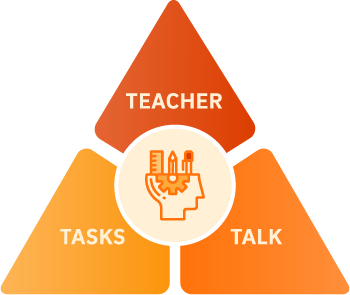"Exploration and understanding are at the heart of what it means to do mathematics."
Francis Su, Mathematics for Human Flourishing
Mathematical inquiry is what mathematicians do. Mathematicians inquire into patterns and relationships and mathematical structure, building their understanding through exploration.
The reSolve vision is for students to experience mathematics in the same way: engaging in genuine inquiry as they explore powerful mathematical ideas, make conjectures, form generalisations, justify their reasoning, and represent their thinking in multiple ways. Students can only have this experience when:
- the teacher proactively guides and supports students,
- tasks facilitate genuine mathematical inquiry,
- and students engage in meaningful mathematical talk, to share and justify their thinking and to make sense of the ideas of others.
This is the reSolve Approach: a shared, research-based vision for high-quality mathematics teaching, that is clear, practical, and deeply engaging for students.

The student experience of genuine mathematical inquiry is at the centre of our vision.
Teacher, tasks and talk form that experience.
Our vision is that students are engaging in genuine mathematical inquiry into powerful mathematical ideas as they learn to see, think, and work like mathematicians.
Engaging in genuine inquiry means grappling with powerful mathematical ideas--fundamental concepts that link different areas of mathematics and foster deep, transferable knowledge. As they engage in inquiry students move through various actions and ways of thinking, continuously strengthening their understanding.
Powerful mathematical ideas emerge in the early years of schooling and evolve in sophistication and complexity throughout the curriculum. Students develop a coherent and interconnected understanding of mathematics through understanding these fundamental concepts.
To gain a deep understanding of powerful mathematical ideas, students must act as explorers and mathematicians—identifying patterns, uncovering relationships, making conjectures, and forming generalisations.
reSolve’s mathematical inquiry practices provide a shared language for discussing what it means to think and work like a mathematician.
Mathematical inquiry practices
- Exploring—Exploring specific examples of mathematical ideas to see what is noticed.
- Conjecturing—Asking questions and making conjectures about what is noticed, and then testing these conjectures
- Generalising—Forming generalisations based on the mathematical patterns and relationships that have been noticed.
- Justifying—Justifying conjectures and generalisations that are made using convincing arguments and proofs.
- Representing—Representing mathematical thinking and concepts in multiple forms.
By engaging in these practices, students deepen their understanding of powerful mathematical ideas, strengthening their ability to reason, problem-solve, and work like mathematicians.